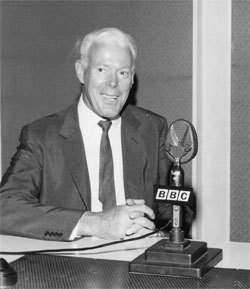Theories 23 June 1986
Trevor Leggett was head of the Japanese Department of the BBC.

This is one of his broadcasts to Japan
Zubari for 23 June 1986
Today I want to say something about theories which affect our behaviour. Some years ago, at a meal in a Japanese home, the grandmother, a very dignified old lady, just before the meal, joined her hands together and stretched them above her head, shaking her body vigorously. Then she joined us in the meal in a dignified way. I wondered why she had done this, but no one gave any explanation. I just quietly accepted it; I supposed it had something to do with health. I had had some experiences in England which (so to speak) prepared me for such eccentric behaviour.
When I was young, I saw a man in a restaurant eating his lunch in a peculiar way. He had a big plate in front of him: some meat, and two vegetables, namely potatoes and cabbage.
This man ate his meal in quite a special way. He separated the meat from the vegetables, and ate it quickly. When he had finished the meat, he looked at his watch, and opened his newspaper. The waitress, thinking he had finished, came to take the plate away, but he told her to leave it. He left the plate, with the vegetables on it, untouched for about ten minutes. Then he ate the vegetables, slowly.
I was about eighteen years old at the time, and our family were sitting at the next table. I was watching this man, fascinated. I whispered to my elder brother: “Look at him. He ate all the meat, and then left the vegetables for ten minutes. Now he’s eating them. Why is he doing that?” My brother just glanced at the man, and said, calmly and indifferently: “He has some theory about eating. No use wondering about it. He has some theory. There are hundreds of theories, and he is following one of them.”
I found out much later that there was indeed a theory, publicized in the early 1930’s by a famous doctor. It was recommended that meat and vegetables should be eaten separately, with а delay between. This man was following that theory. It was supposed to improve digestion.
Later on, I came to realize how such theories are always springing up like mushrooms. They are popular for a short time, and then they die away.
There was once in England a mania for eating carrot juice, to improve the eyesight. One famous case of an enthusiast for this theory was reported in the popular press. This man began to drink carrot juice more and more, and his skin gradually turned a sort of golden yellow. Believing this to be a sign of health, he increased his intake of carrots and carrot juice even more. He suddenly became very ill, and died. The cause of death was an overdose of a particular vitamin contained in carrot juice.
In another case, a man became an addict to pure lemon juice. (It is interesting that the fanatics in these cases are mostly men). He began to take lemon juice more and more. At first, like most of these fanatics, he felt very well. If he did feel ill at any time, he simply took more lemon juice. Finally, he lost all his front teeth. The dentist said that the acid in the lemon juice had just rotted them away.
When I read these cases in the newspaper, I recalled my brother’s words: “He has a theory.”
The words came to me again when I first went to Japan. Even in the middle of summer, some of the Judo men took off а thick woollen haramaki, in the changing-rooms. I tried to find out why they wore it, but none of them could give me a real explanation. In the end, I just accepted it, remembering my brother’s words: “They have some theory. No use wondering about it. There are hundreds of theories, and they are following one of them.”
Well, we have a theory in broadcasting: eight minutes is an ideal time for a light programme. It is just eight minutes since I began, so… Sayonara. I am following my theory.
© Trevor Leggett